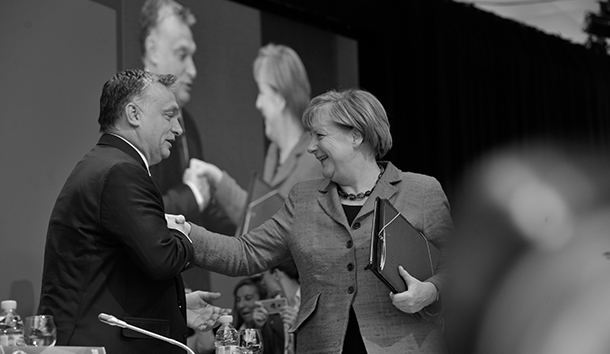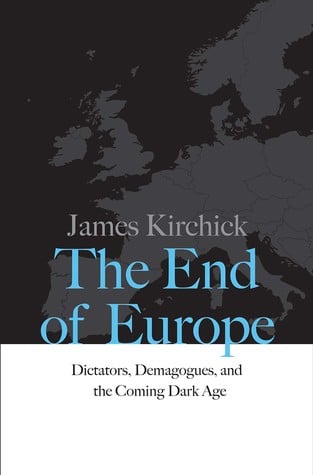Chronicles’ readers probably know James Kirchick better as the author of articles on Ron Paul’s newsletters than as an expert on European politics. The up and coming neoconservative journalist published his exposés of Ron Paul in The New Republic in 2008 and revisited the issue in the pages of The Weekly Standard in 2011. Friends secured him a yearlong gig at Radio Free Europe in Prague, which allowed him to travel extensively. The End of Europe is the result.
The title of the book makes clear that Kirchick is worried about Europe’s future. But his are neoconservative concerns. In 2010, for example, the well-respected German Social Democrat Thilo Sarrazin published Germany Is Abolishing Itself. He predicts that growing Muslim immigration and the falling German birthrate will produce a Muslim majority in Germany by 2100—in other words, the end of Germany. Kirchick, the neoconservative, has no interest in encouraging Germans to have more children. Kirchick starts and ends the book with Russia. Fear of the reassertion of Russian power represents the leitmotif for the whole book.
Kirchick wants to know what went wrong. In the 1990’s it looked as if all of Eastern Europe would join the European Community and NATO, followed by the states of the former Soviet Union. Liberal societies founded on liberal principles would be the norm. All of this would take place under the benign tutelage of an unchallenged United States. Since then, things have not gone the way they were supposed to go. The reason for this is Putin’s Russia.
In the first chapter (“Russia”) Kirchick spends most of his time in Estonia, a former Baltic Soviet state that is now a NATO member. He discusses the Russian-backed coup in Kyrgyzstan and the Soviet invasion of Georgia. Kirchick acknowledges that the Russians have interests in the Baltic and Ukraine. And he can imagine that the Russians might feel threatened by the expansion of NATO. Nevertheless, none of this justifies Russian meddling in the Baltic States or the annexation of Crimea, he continues. Estonia wants to be in NATO, and Ukraine should have an opportunity to develop as a Western-oriented democracy. That is, after all, how post-Cold War history is supposed to go.
The book ends in Ukraine, “The New West Berlin.” Here Kirchick pulls out all the stops:
Russia’s annexation of a neighbor’s sovereign territory, its ongoing war on that neighbor’s soil and its attempt to subvert and overthrow that neighbor’s democratically elected and internationally recognized government represents the starkest threat to world order since Saddam Hussein’s 1990 invasion and annexation of Kuwait.
That isn’t all: “Western failure in Ukraine would signal a decisive blow against the values of liberalism, democracy, and consensus-based interstate relations embodied by the European Union.”
If Moscow were a free-market democracy that affirmed same-sex marriage, Kirchick might be less alarmed about interference in its Near Abroad. But Moscow now represents a threat that goes beyond simple big-power politics. The Russian regime under Putin’s leadership has consciously pursued a nationalistic and “illiberal” course. The Russians have expelled foreign NGOs and cracked down on gay-rights organizations. When Pussy Riot desecrated a Russian Orthodox Church, Putin had them thrown in prison. Russian intellectuals like Alexander Dugin reject Western liberalism, while Russian television airs his views all over the world. Kirchick also emphasizes that the Russian government claims the right to represent the interests of ethnic Russians living in the states of the former Soviet Union. Estonia has a large Russian minority. So do Kazakhstan and Ukraine. To Kirchick that sounds a lot like the Sudeten Germans.
This is the reason why the stakes are so high in Ukraine. A decade ago Ukraine was a corrupt, economically moribund state run by the same men who were in power before 1991. But Kirchick has declared that Ukraine is now on the way to becoming a stable, democratic, and liberal country. The country’s success would pose a mortal danger to the Putin regime. Therefore, Kirchick thinks the United States should arm Ukraine with the best defensive weapons and do everything to bring Ukraine into the Western economy. The “New West Berlin” is Kiev. We are all Ukrainians now.
This Russian nationalist-illiberal model is making converts in other parts of Europe. Chapter Two focuses on Hungary, which Kirchick calls “Democracy without Democrats.” The Democrat without democracy is Prime Minister Viktor Orbán, who asserts that Hungarians want to transcend “the liberal state and the era of liberal democracy.” China, Russia, and Turkey are Orbán’s role models, not the West. Hungary has refused to take in Muslim migrants from other E.U. countries and has built a wall around the country to keep others out. Orbán offered the hundreds of thousands of Hungarians living in Rumania and Slovakia Hungarian citizenship. He has also harassed foreign NGOs that he considers hostile to Hungarian culture. His recent attack on George Soros’s university in Budapest is consistent with this nationalist policy. Orbán is also on very good terms with Vladimir Putin. Politicians in Poland, Slovakia, and the Czech Republic have followed Orbán’s example. Putin’s regime has provided financial assistance to all of them.
Kirchick is most upset about how the Hungarians are writing their history of the 20th century. The focus of Kirchick’s concern is the Monument to the Victims of the Nazi Occupation unveiled in July 2014. Kirchick asserts that the monument downplays the significance of the holocaust as well as the Hungarian role in aiding Adolf Eichmann’s efforts to exterminate Hungarian Jewry. In addition, Kirchick is upset that the “Museum of Terror” in Budapest, which chronicles Hungary under two totalitarian regimes, only mentions the holocaust in 2 of its 20 rooms. The Hungarians, however, view the destruction of Greater Hungary at the Treaty of Trianon after World War I as the great catastrophe. Hungary lost two thirds of her land and a third of her people. The rest of the century is a trail of tears during which Hungarians were ruled by Fascists, Nazis, and the Communists. The holocaust has a place in that history, but not the principal place. Orbán has been emphatic that outsiders will not tell Hungarians what to think. If Orbán and the Hungarians assert this historical narrative against concerted opposition from the West, they will have achieved something that is out of proportion to the country’s size. Kirchick, the neoconservative, understands that as well.
No one has accused the Germans of rewriting their history. Education curriculums in Germany go over the nation’s misdeeds of the 20th century in detail. Kirchick, however, worries about Germany’s attitude toward Russia. He is particularly concerned that the Social Democrats have been too eager to do business with the Russians. This Social Democrat tradition of appeasement goes back to the Treaty of Rapallo in 1922, in which the Weimar Republic and Soviet Russia agreed to economic and military cooperation. Fast-forward 90 years, and Kirchick is enraged by former Social Democratic Chancellor Gerhard Schroeder, who took a high-paying job with a Russian company to lobby the Berlin government to approve a gas pipeline directly linking Germany and Russia through the Baltic Sea. According to Kirchick these economic ties make the Germans reluctant to confront Putin over his actions in Ukraine.
Kirchick gets around to Western Europe in the middle chapters of the book. He is worried. The grand European experiment is stumbling, Brexit being the most obvious example of this. Kirchick spends many pages denouncing Brexit and Nigel Farage, its chief architect, whom he strongly dislikes. Kirchick also addresses the Muslim problem. He correctly criticizes European elites for demonizing a discussion of Muslim immigration. This has only led to the rise of figures like Marine Le Pen and Geert Wilders, nationalist politicians hostile to the European Union. He suggests that European elites should be proponents of a “healthy patriotism” to counter the nationalists.
In his chapter on France, Kirchick looks at the precarious situation of European Jews. He fears that the rise of nationalist parties will lead to antisemitism, and details how the growing number of Muslim immigrants makes life increasingly dangerous for European Jews. (Wearing a yarmulke in Paris is guarantee of verbal harassment or worse.) He notes, too, that Israel no longer enjoys widespread support in Europe.
A good example of this trend is Britain’s Labour Party, which used to represent Britain’s working classes. English Jews played an active role in the party, while support for Israel was a given. In the 1980’s Margaret Thatcher began to win over the middle and working classes, and Labour, in turn, began to transform itself into a party of civil servants, academics, and immigrants. In 1997, Tony Blair’s government threw open Britain’s borders to admit as many new voters as possible. These immigrants generally had little affinity for Israel, while the Muslims were actively hostile to the country. Kirchick excoriates the current Labour leader, Jeremy Corbyn, for his indifference to Labour’s anti-Israel elements. But Corbyn simply reflects the shift in the composition of the Labour Party. And the same thing can be said of the Labor Party in Holland.
Kirchick is correct in seeing “the end” of something in Europe. The post-1989 policies of the European elites—which the neoconservatives supported—have brought the Continent to this point. Globalization and Muslim immigration pushed the European middle and working classes into supporting anti-E.U. and pro-nationalist parties. But American foreign policy has played a key role in driving these changes, too. The expansion of NATO produced a harsh, and predictable, Russian reaction. The invasion of Iraq in 2003—the neoconservative project par excellence—produced the destabilization of the Middle East, the civil war in Syria, and the Muslim invasions of 2015. Europeans know that something is very wrong, even though their leaders keep telling them, “We can do this.” The Eastern Europeans are the cutting edge of the revolt, while Nigel Farage, Marine Le Pen, and Geert Wilders lead the charge in the West.
We are indeed approaching the end of something. Whether or not that is a bad thing remains an open question.

[The End of Europe: Dictators, Demagogues, and the Coming Dark Age, by James Kirchick (New Haven, CT: Yale University Press) 288 pp., $27.50]

Leave a Reply